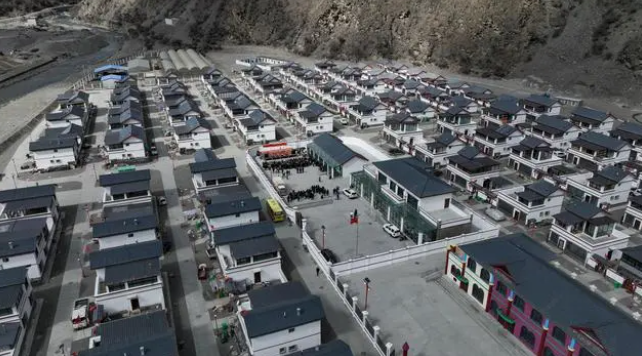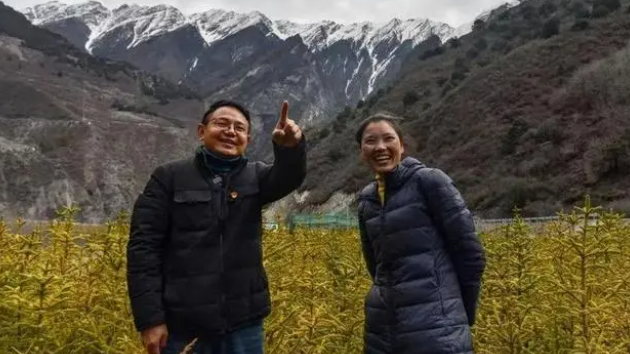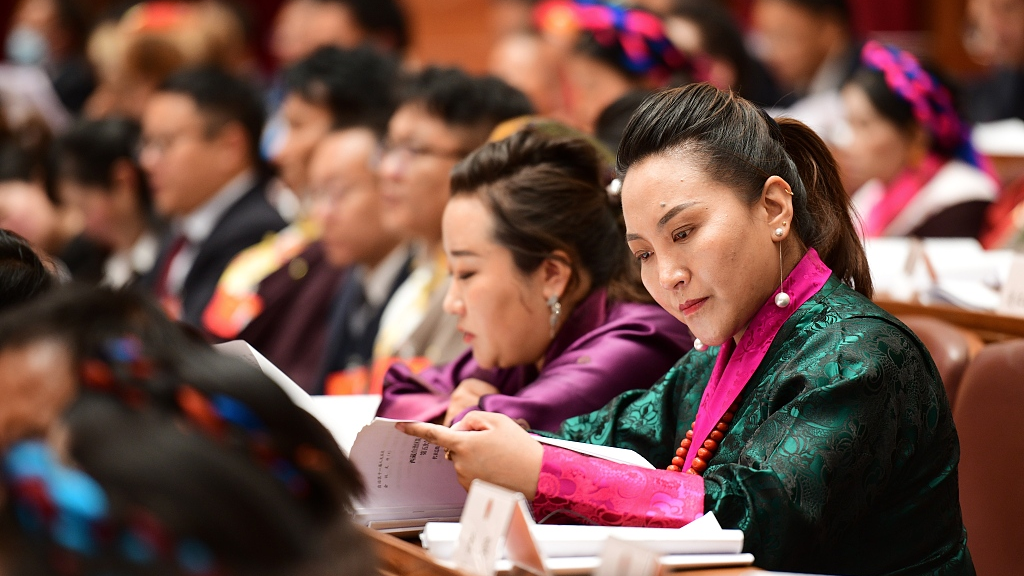
An aerial view of two-story residential buildings in Doyu Lhoba Ethnic Autonomous Township in southwest China's Xizang Autonomous Region, February 15, 2023. /Xinhua
An aerial view of two-story residential buildings in Doyu Lhoba Ethnic Autonomous Township in southwest China's Xizang Autonomous Region, February 15, 2023. /Xinhua
Tashi Gyaltsen is delighted that the 90-kilometer road linking Doyu Lhoba Ethnic Autonomous Township to Longzi County in southwest China's Xizang Autonomous Region has been updated from a dirt surface to the high standards of today.
The 34-year-old believes the changes have much to do with the proposals on improving local infrastructure he put forward when he was a deputy to the 13th National People's Congress (NPC). He still remembers how locals complained about the dirt road when talking with him.
During his tenure as a deputy, Tashi Gyaltsen said he put forward more than 10 proposals and most resulted in policies and measures to help improve infrastructure as well as local well-being.
Along with the improved road and traffic flow, the three villages in the township have seen two-story residential buildings spring up in recent years, with tap water, electricity and internet made available.

Tashi Gyaltsen (L) talks with a villager in Doyu Lhoba Ethnic Autonomous Township in southwest China's Xizang Autonomous Region, February 15, 2022. /Xinhua
Tashi Gyaltsen (L) talks with a villager in Doyu Lhoba Ethnic Autonomous Township in southwest China's Xizang Autonomous Region, February 15, 2022. /Xinhua
"Villagers are living in decent homes. They own cars and drive to the cities to go on holidays," said Tashi Gyaltsen, noting that there were only a few cars in the town a decade ago.
Earlier this year, he was elected as one of the 24 Xizang deputies to the 14th NPC. This time he is much more confident in fulfilling his duties and has a better understanding of the role.
"A competent NPC deputy should care about people's interests, help people solve their problems and reflect people's will," he said.
His understanding reflects the essence of the whole-process people's democracy, which involves the running of the country by the people so as to give full expression to people's will and protect their rights and interests, according to a report delivered by Chinese President Xi Jinping at the 20th National Congress of the Communist Party of China (CPC).

Deputies from Xizang attend the fifth session of the 11th People's Congress of Xizang Autonomous Region, January 5, 2022. /CFP
Deputies from Xizang attend the fifth session of the 11th People's Congress of Xizang Autonomous Region, January 5, 2022. /CFP
Losang Wangmo, a deputy to the 12th People's Congress of Xizang and also the head of the Party's village committee in Shannan City, has the same approach as Tashi Gyaltsen.
"As a deputy elected by villagers, I have the responsibility to reflect what they want and live up to the trust they have placed on me," said Losang Wangmo, who called on the local legislature to beef up support for the village's grape planting base at the first session of the 12th People's Congress of Xizang. The grape planting base has greatly increased locals' income.
Losang Wangmo is one of the more than 42,000 deputies to people's congresses at four levels – autonomous region, city, county and township – in Xizang.
Losang Jamcan, director of the Standing Committee of the Xizang Autonomous Regional People's Congress, pointed out that the number of deputies to people's congresses at county and township levels in Xizang has increased by nearly 6,500 since 2018. This has further improved the structure of deputies, thus fully reflecting the universality of deputies and consolidating and expanding the foundation of community-level democracy.

A serf carries a serf owner before the peaceful liberation in Xizang. /CFP
A serf carries a serf owner before the peaceful liberation in Xizang. /CFP
Wang Qingxian, vice president of the Party School of the Xizang Autonomous Regional Committee of the CPC, noted that more than 90 percent of the deputies in Xizang are from local ethnic groups, adding that the political rights and interests enjoyed by people of all ethnic groups in Xizang are in stark contrast to those who suffered from feudal serfdom before the democratic reform in the region.
The reforms in 1959 brought feudal serfdom to an end and granted political, economic and social emancipation to a million serfs and slaves, according to a white paper titled "Xizang Since 1951: Liberation, Development and Prosperity," which was issued by the State Council Information Office in May 2021.
After the former serfs and slaves elected people's governments at all levels during the first general election held across Xizang in 1961, the first session of the first People's Congress of Xizang was convened in Lhasa in 1965, said the white paper.
Attended by 301 deputies – mostly from local ethnic groups – the first session witnessed the founding of the Xizang Autonomous Region and the birth of the Regional People's Government, creating the conditions for all ethnic groups in Xizang to enjoy equal rights to participate in the administration of regional and state affairs.

People pose for a photo in Jokhang Temple Square in Lhasa City, southwest China's Xizang Autonomous Region, May 19, 2023. /CFP
People pose for a photo in Jokhang Temple Square in Lhasa City, southwest China's Xizang Autonomous Region, May 19, 2023. /CFP
Today, the regional government has introduced more measures to enhance communication with local residents to hear people's voices. For example, Xizang is accelerating the building of 772 service stations where deputies can communicate with local residents across most villages, neighborhoods and communities in the region.
And from 2018 to 2022, the Standing Committee of the Xizang Autonomous Regional People's Congress received more than 1,300 suggestions, criticisms and opinions, all of which were solved through consultations.
The enhanced communication between deputies and local residents as well as the quick feedback strengthens people's ability to fully participate in the democratic process and governance.
"The whole-process people's democracy is the defining feature of socialist democracy; it is democracy in its broadest, most genuine, and most effective form," according to Xi's report to the 20th CPC National Congress.
Expecting his proposals at the first session of the 12th People's Congress of Xizang to be accepted and implemented, Losang Wangmo continues to fulfill his duty to hear villagers' voices and serve their interests.
"It's an honor as well as a responsibility for me to be a participant in the whole-process people's democracy," Losang Wangmo said.